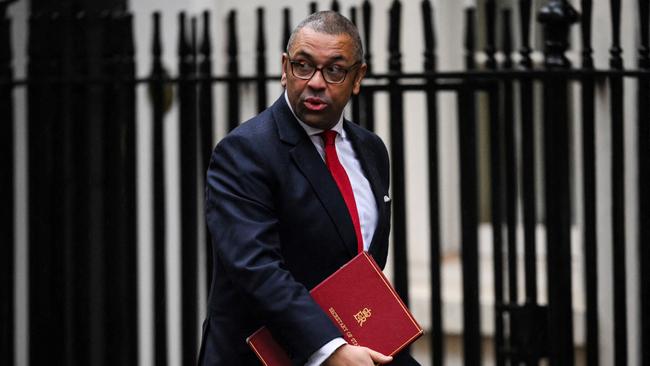Britain and EU take stock before push toward deal
The two sides will decide whether to enter into intensive negotiations on the most difficult issue remaining from Brexit.

Britain and the EU will assess progress made during months of technical Brexit talks overnight on Monday, and decide whether to enter into intensive negotiations on the most difficult issue remaining between the two sides.
British Foreign Secretary James Cleverly is due to meet Maros Sefcovic, the EU’s chief negotiator, for the second time this month after consultations with Northern Irish leaders last week.
Whitehall sources said the two men would assess remaining gaps between the two sides on proposals to reduce Customs checks on goods crossing between Britain and Northern Ireland, and the scope for further compromise.
Among the issues still to be resolved include the ban on some types of plants, including seed potatoes, from being exported to Northern Ireland, and disparities on pet passports. Other issues, such as a new Customs data sharing system, have been agreed, giving hope that a wider deal is possible.
A sticking point remains on what role the European Court of Justice has in policing the Northern Ireland Protocol. This is yet to be formally discussed between the two sides, but the EU has insisted that the court be the final legal authority on the protocol, a position rejected by the British government and main unionist parties in Northern Ireland.
Sources said that if Mr Cleverly and Mr Sefcovic judged that sufficient progress had been made on the technical side of talks, then it could result in a “renewed push” to resolve “the hardest issue”. However, they said that Monday’s meeting was “low key” and any attempt to move talks on would have to be signed off by Prime Minister Rishi Sunak and Ursula von der Leyen, president of the European Commission.
The meeting comes before a deadline on Thursday for Chris Heaton-Harris, the Northern Ireland secretary, to call new elections after the failure of the parties to agree on the formation of a power-sharing executive. Government sources have indicated the deadline could be pushed back again, having been postponed last month.
“We have to assess whether, as things stand, the remaining gaps between the two sides can be closed,” a Whitehall official said. “The judgment we need to make is whether we’re close enough (on technical issues) to start talking about the most difficult political issue we need to resolve if we are to get a deal.”
As part of its 2019 divorce deal with the trade bloc, Britain agreed to the so-called Northern Ireland Protocol, placing a Customs border within its own country to avoid building border infrastructure between Ireland, an EU member, and Northern Ireland, part of Britain. It did so to avoid inflaming sectarian tensions among the Catholic Irish nationalist community in the province, which has long had tensions with the mostly Protestant unionist communities.
The Times



To join the conversation, please log in. Don't have an account? Register
Join the conversation, you are commenting as Logout